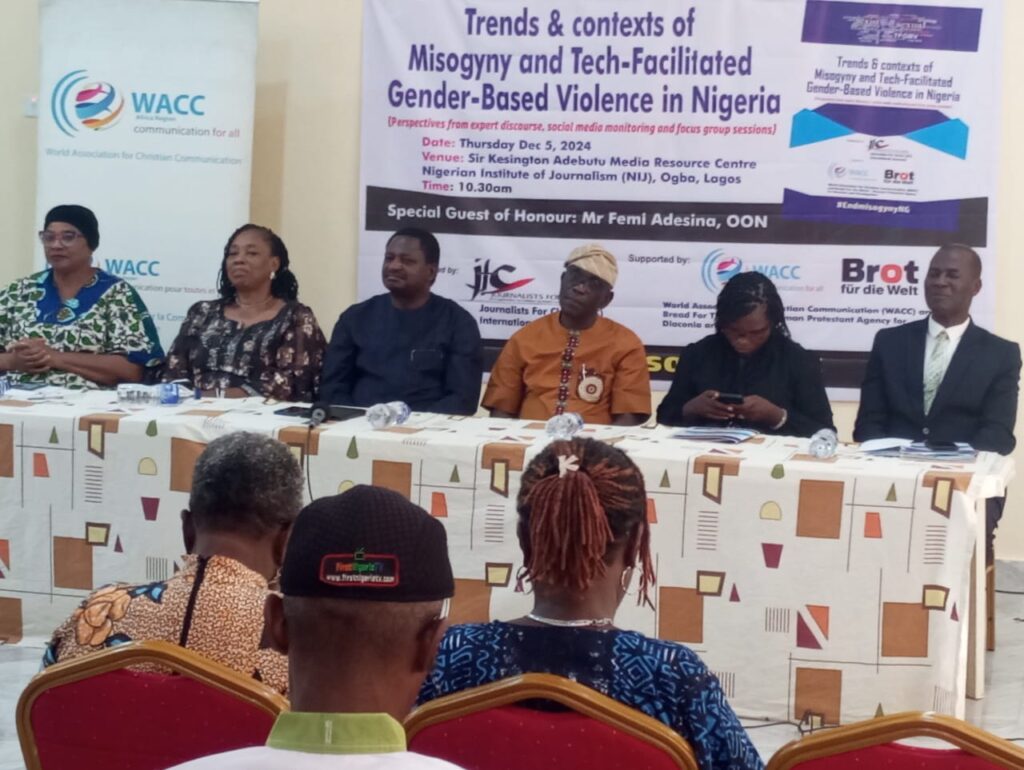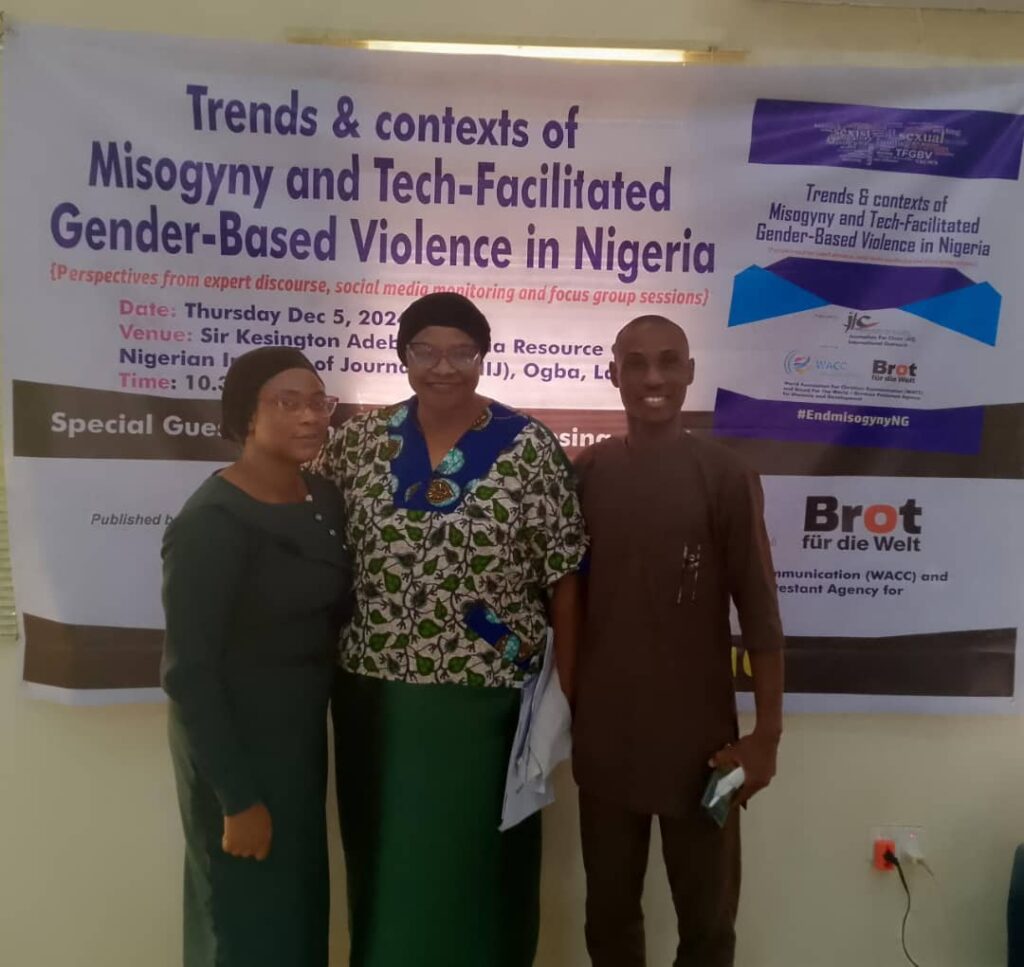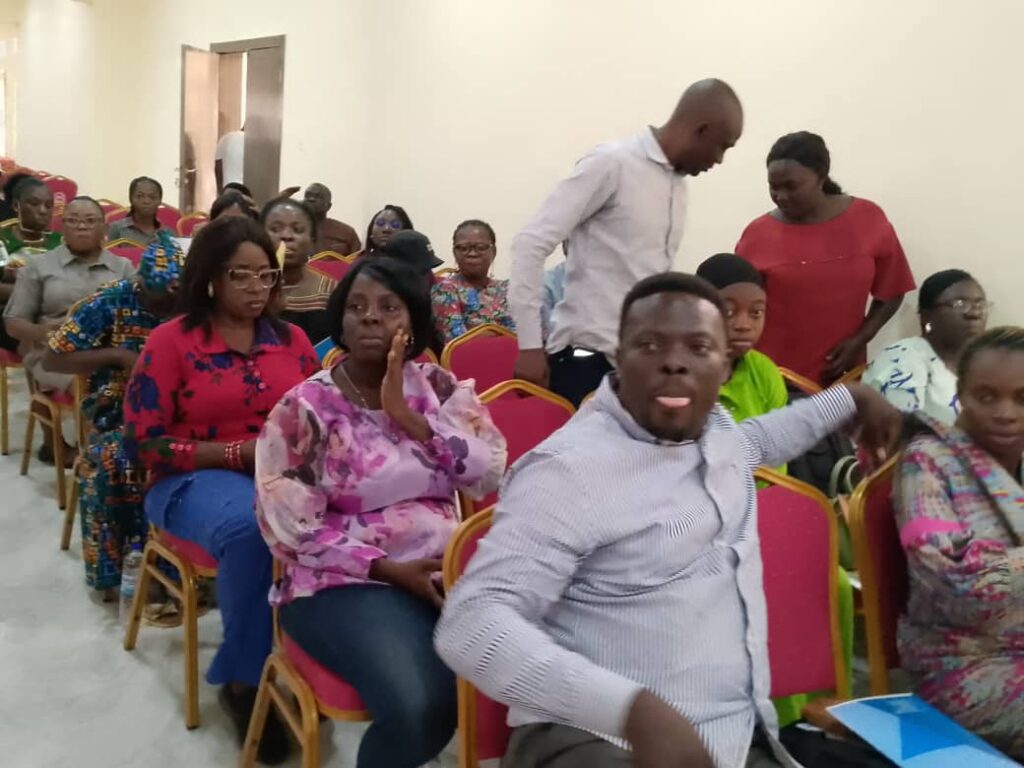Facebook Tops List of Platforms for Tech-Facilitated Gender-Based Violence in Nigeria, Report Reveals
By Jimoh Elizabeth Oluwaseyi
A groundbreaking report from Journalists For Christ (JFC) has shed light on the pervasive issue of Tech-Facilitated Gender-Based Violence (TFGBV) in Nigeria, revealing that Facebook stands out as the primary platform for such abuses.
This alarming finding comes amidst a global outcry for justice and accountability during the #16DaysOfActivism against gender-based violence.
The report, presented at a recent event in collaboration with the World Association for Christ Communication (WACC), documented a staggering 66 incidents of TFGBV across various platforms, with Facebook accounting for 49 cases. In contrast, X (formerly Twitter) and Instagram recorded 8 incidents and TikTok 1, respectively.
A Digital Disturbing Landscape
The findings illustrate a troubling landscape where male perpetrators were responsible for 28.8% of the incidents, while female perpetrators accounted for 25.8%. Notably, bloggers and skit makers contributed significantly to the problem, comprising 22.7% of the cases, alongside social media influencers and public figures, who represented 4.6%.
This data underscores a disturbing trend of online misogyny and harassment that is often perpetuated by those in positions of influence.

At the forefront of the event, former presidential spokesman Mr. Femi Adesina emphasized the necessity of disseminating the JFC report to hold offenders accountable.
“We must publish and propagate the JFC report on Misogyny,” he asserted, stressing the urgency to combat these dehumanizing acts before they escalate further.
A Call for Digital Accountability
Project Officer and Publisher of BoNews, Ms. Blessing Oladunjoye, highlighted the severity of online harassment, particularly against women.
“These acts are designed to target women and harass them through electronic means,” she noted, detailing various forms of abuse, including cyberbullying and doxxing.
The report also highlighted specific instances of misogynistic commentary surrounding Adaora Umeoji’s appointment as Zenith Bank’s first female CEO. The backlash she faced, filled with derogatory remarks questioning her professional merit, exemplifies the deep-rooted misogyny that still exists in society.

Misogyny is Taught and Why Accountability Matters
Mr. Gbenga Adefaye, Provost of the Nigerian Institute of Journalism, recognized the report’s significance, expressing a desire for personal reflection on attitudes towards women.
“I would love to read this report and reflect on my own attitudes toward women.” His comments highlight the need for ongoing self-examination and societal change in combating misogyny.
JFC Founding President, Mr. Lekan Otufodunrin, stressed the importance of promoting fundamental human rights in the face of rising misogyny.
“Since the trend of Misogyny and TFGBV has become worrisome globally, we have conducted research to quantify these issues,” he stated, “because it’s possible to speak about these things, but we need to put figures to them, as these research involves monitoring of social media and seeing these trend and paying attention to them,” underlining the importance of data in advocating for change.

Addressing Online Misogyny Requires Collaboration and Education
The event also featured insights from Betty Abah, founder of the Centre for Children’s Health Education, Orientation and Protection, who praised the efforts of special guest, Mr. Femi Adesina and JFC Project Coordinator Lekan Otunfodunrin as male allies in the fight against gender-based violence.
“These are men liberated from the mental shackles of misogyny who support us in this fight,” she remarked, highlighting the necessity of collaboration over confrontation.
Mrs. Odum Oruma, a Senior Mass Communication Lecturer, urged women to leverage education as a powerful tool in combating gender-based violence, encouraging resilience against societal pressures.
Challenging women who may inadvertently support online gender-based violence, Odum called for courage and resilience.
“I tell women you must be tough against those who think they are ‘Alpha and Omega,’” she asserted.
The Vice President of JFC, Ugonma Cokey, presented findings from focus group discussions that revealed alarming trends in the weaponization of platforms like WhatsApp for shaming women.
The discussions emphasized the need for men’s involvement in dismantling the structures that perpetuate gender-based violence.
“Our session for men was particularly enlightening,” she noted, “serving as a platform to educate them about the detrimental effects of misogyny and the role they can play in fostering a more equitable society.”
Addressing Religious and Biblical Misconceptions of Men’s Roles: A Multifaceted Approach
Pastor Evans Emmanuel also contributed to the discussion, addressing misconceptions about the Bible’s role in perpetuating gender-based violence.
“God doesn’t evaluate us based on gender,” he stated, citing how Jesus empowered women during his lifetime.
Emmanuel recalled the pathetic impact of misogyny on his mother’s education, fueling his passion for eradicating all forms of gender-based violence. “This deep-seated anger drives me to champion this cause.”





Comments